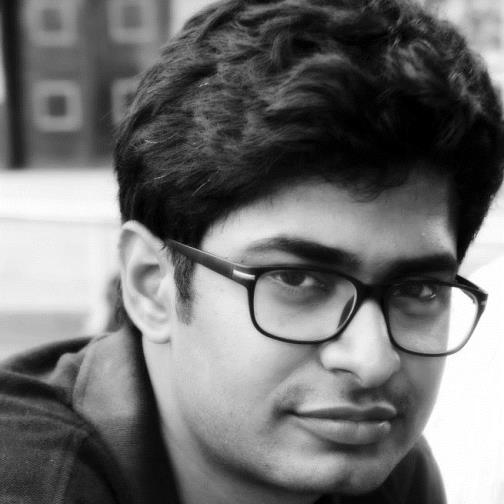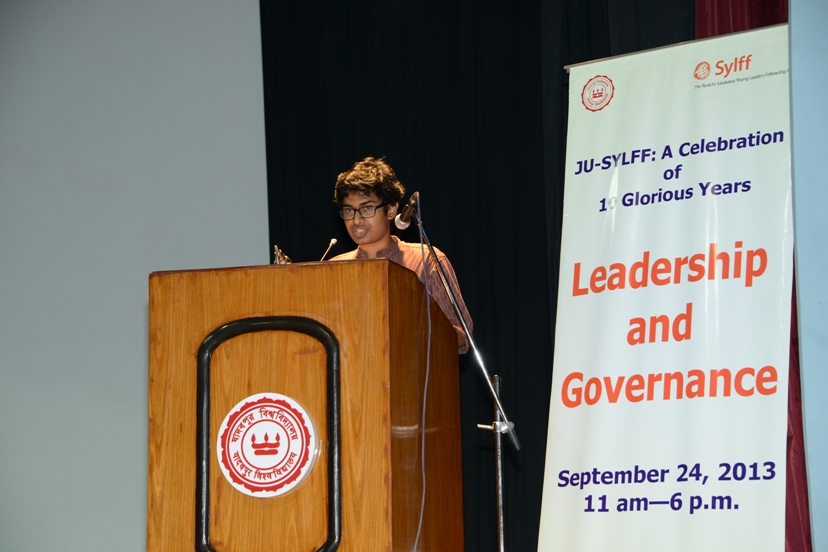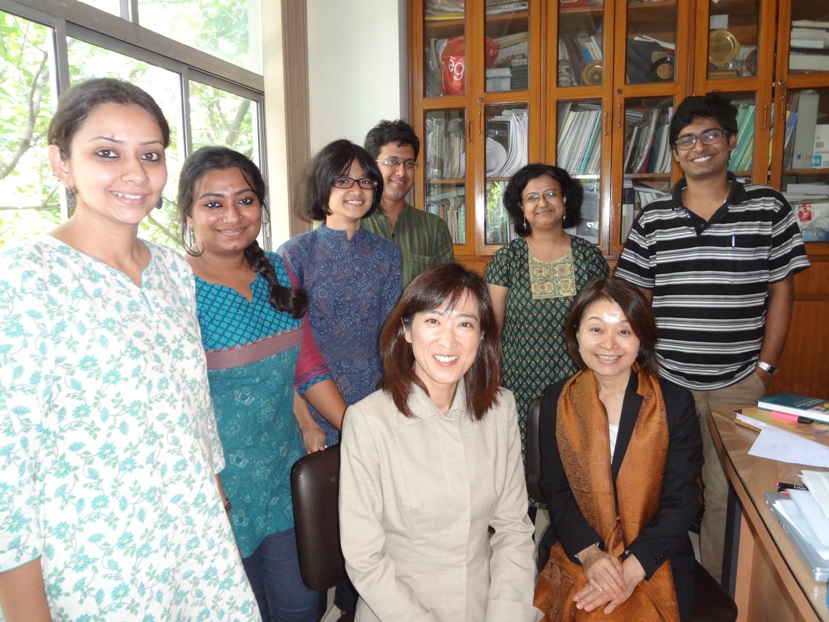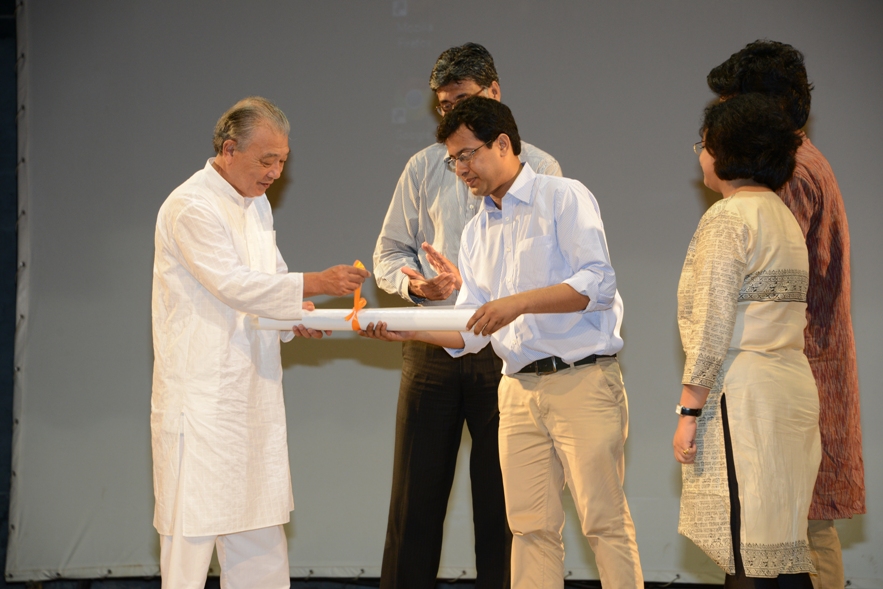Voices from the Sylff Community
Dec 24, 2013
A Lesson in Leadership: Organizing the Jadavpur Tenth Anniversary Celebration
Jadavpur University is located in Kolkata, the former capital of India and the religiously and ethnically diverse cultural center of the Bengal region. The city has a rich and active local tradition in the arts, including drama, art, film, theatre, and literature. That tradition was alive and well at the tenth anniversary celebration of the Sylff program at the University, which featured a documentary film, a special edition newsletter, and a lively debate.
The Jadavpur University Sylff Association organized a full day of events under the theme of “Leadership and Governance.” India is still searching for a perfect model of governance, as leadership often cannot be fully exercised for want of institutional support.
For the members of the association, preparing for this big event provided valuable lessons in leadership, public communication, and collaboration. Two young fellows who played a central role in organizing the event share their thoughts below.
* * *
Aritra Chakraborti
Principal Organizer, JU-SYLFF Association (Sylff Fellow, 2012)
When I became a PhD-level Sylff fellow in July 2012, Professor Joyashree Roy, the Project Director for JU-SYLFF, told me that I would have to take up a major role in the proposed Tenth Anniversary Celebration of the Sylff Program in Jadavpur University. A few months into my tenure as a Sylff fellow, I was made the principal organizer of the JU-SYLFF Association, and I knew straightaway that I had a lot of hard work ahead of me.
My worries were mitigated by the presence of a team of very committed colleagues eager to work together, people whom I have known for a long time as students at the University. Now, when I look back at those days that were filled equally with anxiety and enthusiasm, it becomes evident how every Sylff fellow—from the senior-most fellows who joined in 2003 to the newly selected batch of 2013—did their best to make the event a success.
I still remember sending the first e-mail, back in October 2012, asking the Sylff fellows to come for a meeting where we were to discuss how we would go about organizing the major event. The fellows responded enthusiastically by turning up in large numbers. It was the first in a series of meetings that were held during the course of the preparations.
We decided that, in order to organize an event of this magnitude, we would have to take up a lot of responsibilities, including raising funds to cover the event’s expenses. Our target was to showcase the various activities and both the academic and non-academic achievements of the association and the fellows, as well as making the JU-SYLFF Program more visible within and outside the University.
We were helped immensely by our Project Director, Professor Roy, and Sylff assistants Sayanti Mitra (who left shortly before the event) and Samrat Roy (who replaced her). Suman Datta, who has been associated with the JU-SYLFF Program for a long time and remains irreplaceable, was always there whenever we needed his help and advice. The association also received generous support from members of the University administration, who cooperated with us in every way possible, thus making the celebration a truly collaborative event.
The Sylff Program requires that the fellows reach beyond their academic duties and fulfill various other roles as socially responsible leaders. One major benefit of this schooling is that it teaches the fellows the very useful skills of multitasking and rising beyond personal likes and dislikes for the benefit of a common cause. In taking up multiple duties, for instance, students of history and philosophy found the hidden designer in them; and those studying the intricacies of economics found themselves practicing the fine art of letter writing and selecting the perfect menu for lunch.
Being the principal organizer of the JU-SYLFF Association, I had to take up multiple duties as well: With Nikhilesh Bhattacharya and Sreerupa Sengupta, I co-edited the tenth anniversary edition of our annual newsletter, Fellows, and with the latter, I co-directed a short documentary titled, JU-SYLFF: The Journey So Far, detailing the decade-long journey of the Sylff Program at Jadavpur University. The documentary, which was shown on the day of the celebration, was conceptualized as an exciting and unconventional way of preserving the story of the wonderful partnership that the University and the Sylff Program have formed (click here to view the video). We tried our best to cover the entire history of the program—from the award ceremony at the Rajbhavan (Governor’s House) in 2003, through the formation of the JU-SYLFF Association and its various social and academic activities, to the present state of the program and what the fellows have gained by being a part of this community.
Former Vice-Chancellor of JU, Professor Ashoke Nath Basu, told us in the interview that was used as the introductory speech for the documentary how the introduction of the Sylff Program has helped the University to carry out cutting-edge research in interdisciplinary areas. The then Vice-Chancellor of the University, Professor Souvik Bhattacharyya, told us in his interview how he saw this wonderful partnership blossoming into a very profitable association in near future. By telling the story of our long and highly valued ties with philanthropic organizations such as the Premananda Memorial Leprosy Mission Hospital, we tried to show how the JU-SYLFF Association is trying its best to reach beyond the ivory tower and take part in social action programs. Duke Ghosh, one of the earliest Sylff fellows who did the voice-over for the documentary, re-collected the occasion when the University had the honour of hosting the South-Asia Pacific Regional Forum in 2007.
Despite our best efforts, though, we did feel the pressure during the final days of the preparations: There were sleepless nights as we tried very hard to tie up all the loose ends. In the end, however, we found that everything can come together when likeminded and determined people stick together. We received a lot of help from people who had little to do, directly, with the Sylff community previously. This, for me, was the highlight of the event, as it showed the bonding that the Sylff network has created within the University community. The Jadavpur University Press lent its expertise in designing the special edition of the annual newsletter. Researchers from the School of Women’s Studies gave us technical advice on creating the documentary. Ramprasad Gain, a former student of film studies at Jadavpur University and now an editor in the Bengali film industry, spent sleepless nights with us during the last few days editing and making last minute changes to the documentary.
There were moments of frustration and fear. During the last days of the preparations, the project director was travelling and there were times when we did feel that we had bitten off more than we could chew. But we also understood very quickly that these were part and parcel of preparing for any event of this magnitude. The key was not to lose focus: We had to be perfect in everything, since we were to host a lot of very important people on that day. In these moments of anxiety, the senior fellows took charge and provided guidance for the younger ones. Now, when I look back at the day of the event when everything proceeded perfectly, I think that those days of endless pressure were worth going through.
Nikhilesh Bhattacharya (Sylff Fellow, 2013)
My stint as a JU-SYLFF fellow began in a whirr of activity. When I was selected for the fellowship program I had no idea I was going to be thrown in at the deep end. As it happened, I joined in August 2013, less than two months before the tenth anniversary celebration of the Sylff Program in Jadavpur University. By then, preparations for the big day had already entered the final phase.
JU-SYLFF fellows had the responsibility of planning, organizing, and partly funding the day-long event on September 24, 2013. It meant a lot of work for all of us. And we had to balance that work with our academic responsibilities because the celebration was being held mid-term.
The first rule was good teamwork. Without it we could never hope to execute the diverse tasks facing us. This was, in a sense, a refreshing departure from academic research, which at times can be a rather lonely pursuit. Hours spent reading a book in the far corner of a library, poring over manuscripts in a desolate archive, or writing a thesis in a closed room ignoring the revelry outside bring their own reward. But team dynamics, too, is a fascinating subject: How the chain of command functions; how team members react to responsibilities; and how friendships are forged and occasional differences resolved (or not!).
On this occasion, the team’s task was made difficult by the fact that Joyashree Roy, the JU-SYLFF Project Director, was travelling extensively in the lead up to the celebration. That meant we were effectively left without a unanimously accepted leader for much of the time. The academic community of Jadavpur University is fiercely egalitarian and establishing a command chain with a temporary head was always going to be tricky. The core team was also small because most of the former JU-SYLFF fellows no longer live in Kolkata but are based in different places across the world.
This is where the former fellows who were still in the city played a crucial role. While all fellows, past and present, contributed to the program fund, Sreerupa Sengupta, Duke Ghosh, Rimple Mehta, Anindita Roy, Ritajyoti Bandyopadhyay, Deeptanil Ray, Nilanjan Pande, Sebanti Chatterjee, Abhishek Basu, and Payoshni Mitra took time off from their busy schedules to take charge of the preparations. We also got help from the administrators, teachers, and members of the university’s non-teaching staff whenever we asked.
I had the cushy job of coordinating among the fellows, which allowed me to order them around, lend a helping shoulder when someone was down, and, once or twice, order boxes of pizzas and pass them off as working lunch. My other responsibility was to put together the special edition of the JU-SYLFF Association’s newsletter, Fellows.
On the day of the event I could not follow the proceedings in the first session because most of my morning was spent making frequent trips backstage with instructions and ensuring everyone connected with the program had lunch. In between I was briefly on stage with Mr. Yohei Sasakawa, chairman of the Nippon Foundation, and the editorial team of Fellows for the launch of the special edition. The warm smile on Mr. Sasakawa’s face reassured me that things were going well.
The last session saw a lively debate. The motion of the house was “Leadership is more important than governance,” and each debater could choose whether to speak for or against it. We settled on the subject because it is extremely relevant in a developing country such as India, where the search for a perfect model of governance is still on, and leadership often cannot fulfill its potential for want of institutional support. Two factors were kept in mind in choosing the participants: moderator Sugata Marjit and debaters Prasad Ranjan Roy, Supriya Chaudhuri, Anup Sinha, and Anchita Ghatak. One was that all be leaders in their respective fields, ranging from the Indian administrative service, academics, business administration. and women’s rights. And the other was that they be involved in governance in one way or the other. Some have been associated, directly or indirectly, with the JU-SYLFF Program for a long time. The debate taught us that good governance must lay the foundation for leadership to flourish.
What else did I learn from the experience of being part of a team tasked with planning and organizing an event of such scale? I learnt a new skill: I can now work with the design software used to make the layout of the newsletter. I learnt to keep calm, or at least appear so, when things were seemingly going haywire. And I learnt that the job is not done until the last payment has been made and accounts settled, which can be many days after the event is over.
More importantly, I learnt there is nothing more fun than taking collective ownership of an event and being able to stage it without a hitch. I couldn’t have had a better initiation into the larger Sylff family spread across the world.
Read related Sylff News article here.




